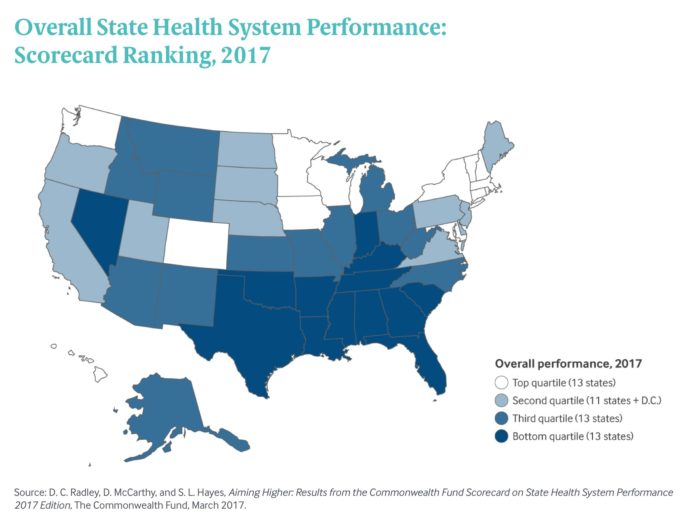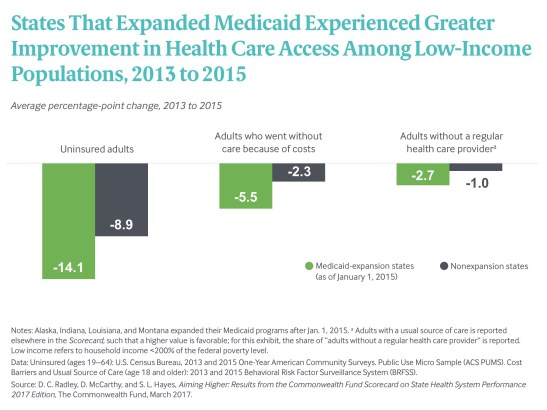Georgia’s ranking on a health system scorecard has improved from 46th in the nation to 41st.
The Commonwealth Fund’s 2017 scorecard ranked the 50 states and the District of Columbia on the most recent data available in five areas: health care access, quality, avoidable hospital use and costs, health outcomes, and health care equity.

Georgia tied with South Carolina and Texas at No. 41, improving five spots from the last score card, in 2015.
Vermont was the top-ranked state overall in this year’s Commonwealth Fund report, followed by Minnesota, Hawaii, Rhode Island and Massachusetts.
Georgia joined most other Southern states in the bottom quartile of the rankings.

Only two states in the South rated higher: Virginia and North Carolina.
The scorecard, recently released, noted that states that have expanded their Medicaid programs under the Affordable Care Act were clustered at the top of the rankings.
California, Colorado, Kentucky, New York, and Washington state made the biggest jumps in ranking, with New York state moving into the top-performing group for the first time.
Kentucky, which expanded its Medicaid program, stood out for having improved on more measures than any other state, the report said.
The Commonwealth Fund noted that the uninsured rate among low-income working-age adults dropped an average of 14.1 percentage points in states that expanded Medicaid, compared to 8.9 points in non-expansion states such as Georgia.

Georgia has declined to expand Medicaid, citing the impact on the state’s budget.
The state’s current uninsured rate, though improved, is still one of the highest in the nation. The latest U.S. Census report put it at 13.9 percent in 2015.
The Commonwealth Fund’s president, Dr. David Blumenthal, said in a statement that “it’s clear that states, especially those that have expanded Medicaid, have made substantial progress ensuring that their residents have health insurance, and millions are better able to get the health care they need since the . . . [ACA] was passed. Any plan to repeal or amend the ACA must hold on to those gains.”
Congress is considering legislation to repeal the ACA and replace it with a different system. The Congressional Budget Office has estimated that the new plan would lead to more people without coverage, while at the same time lowering the budget deficit.
Georgia’s best category on the scorecard was the avoidable hospital use metric (i.e., limiting unnecessary use of hospital care), where the state ranked 23rd. In the other four categories, the state ranked in the 40s. (Here’s a link to the report.)

Marsha Davis of the University of Georgia’s College of Public Health noted that Georgia’s greatest improvements in the report included decreasing the number of uninsured children and adults; decreasing the number of adults going without care because of costs; and increasing the number of children who get all their vaccinations.
“These improvements are related to and coincide with the implementation of the Affordable Care Act,’’ said Davis, associate dean for outreach and engagement at the college. “Premature death rates increased, as they did for most states. What is of great importance in these data is the notion that place matters — where you live is related to your ability to get access to health care and your prospects for living a long and healthy life.
“There are continued disparities in Georgia based on income and ethnicity.”
The health equity measure showed Georgia’s uninsured rate varied significantly based on income and race.
On the prevention measure, Georgia scored well on children’s vaccination rate and on home health patients whose wounds improved or healed after an operation.
But the state ranked poorly on children with emotional, behavioral or developmental problems who received needed mental health care in the past year, and on bloodstream infections associated with central lines, or catheters.
Gov. Nathan Deal has advocated for more funding in his budget to expand children’s mental health services under Medicaid and PeachCare. Currently that coverage is limited to children 4 and older. It would be extended to younger children under Deal’s proposal.
The report’s healthy lives ranking showed Georgia with a low rate of suicides but a high percentage of breast cancer deaths.

